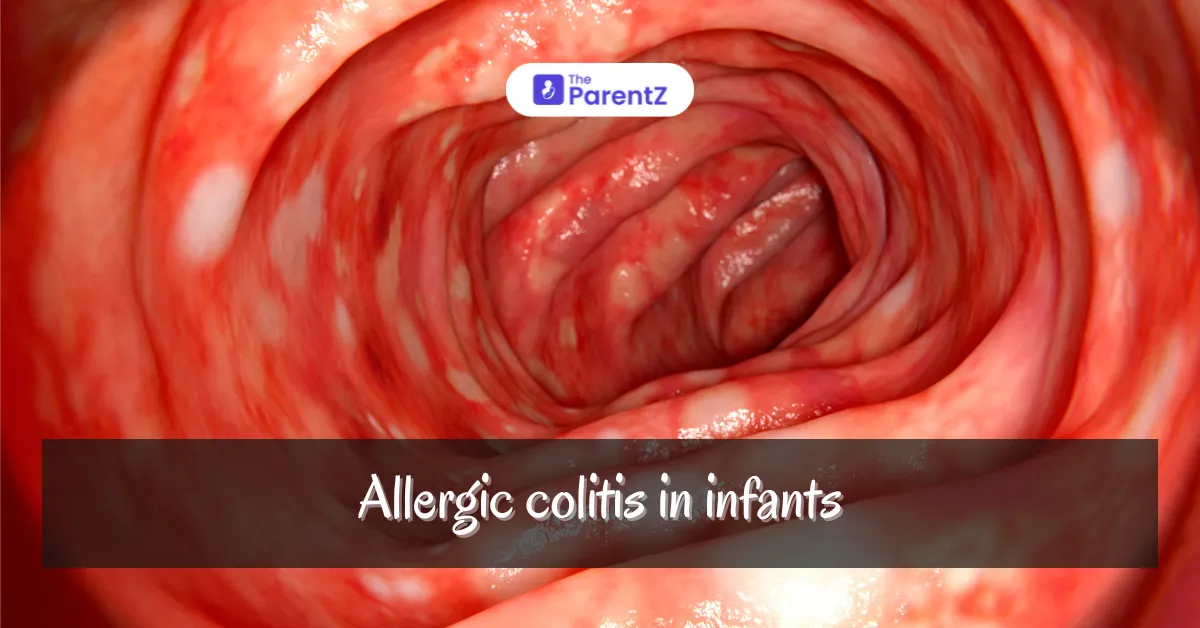While it is not life-threatening, allergic colitis can significantly impact a child’s quality of life and nutritional status. This condition is primarily observed in infants during their first year of life but can occasionally persist into early childhood.
What is Allergic Colitis?
Allergic colitis falls under the umbrella of food protein-induced allergic gastrointestinal disorders (FPIAGD). It is a non-IgE-mediated allergic reaction, meaning it is caused by immune cells other than IgE antibodies, which are typically involved in immediate allergic reactions.
The condition is characterized by inflammation of the colon due to hypersensitivity to certain dietary proteins. Unlike other food allergies, allergic colitis typically presents with delayed symptoms, often a few hours to days after ingestion of the triggering protein.
Epidemiology
• Incidence: Allergic colitis affects approximately 2%-3% of infants globally.
• Age Group: Most cases occur in the first 6 months of life, and many children outgrow the condition by their first or second birthday.
• Breastfeeding vs. Formula Feeding: Although more common in formula-fed infants, exclusively breastfed infants can also develop allergic colitis due to proteins transferred through breast milk.
Causes and Risk Factors
1. Dietary Proteins
• Cow’s Milk Protein: The most common trigger in both formula-fed and breastfed infants.
• Soy Protein: A secondary allergen, particularly in infants who are switched to soy-based formulas.
• Other Proteins: Less commonly, proteins from eggs, wheat, or nuts may contribute other Proteins:
2. Genetic Susceptibility
A family history of atopy (allergic diseases such as eczema, asthma, or hay fever) increases the likelihood of developing allergic colitis.
3. Immature Gut Barrier
The underdeveloped intestinal lining in infants allows larger proteins to pass into the bloodstream, eliciting an immune response.
4. Gut Microbiota Dysbiosis
An imbalance in gut microbiota can exacerbate immune sensitivity, contributing to allergic reactions.
Symptoms of Allergic Colitis
The clinical presentation of allergic colitis can vary but often includes:
Gastrointestinal Symptoms:
• Blood-Streaked Stools: The hallmark symptom, often accompanied by mucus.
• Diarrhea: Watery stools are common, sometimes leading to dehydration.
• Vomiting: Mild regurgitation or projectile vomiting may occur.
• Abdominal Pain and Cramping: Infants may present with irritability, arching of the back, or excessive crying.
Systemic Symptoms:
• Failure to Thrive: Poor weight gain due to malabsorption or persistent diarrhea.
• Skin Symptoms: Some children may develop a rash or eczema in association with food allergies.
Diagnosis
1. Clinical History:
• Detailed dietary history, including breastfeeding vs. formula feeding.
• Family history of allergic diseases.
• Symptom patterns, especially in relation to food intake.
2. Stool Tests:
• Presence of Eosinophils: Indicating immune-mediated inflammation.
• Occult Blood Test: Detecting microscopic blood in the stool.
3. Elimination Diet and Reintroduction:
• Removing suspected allergens (e.g., cow’s milk protein) from the diet and monitoring for symptom resolution.
• Gradual reintroduction to confirm the diagnosis.
4. Endoscopy and Biopsy (Rare Cases):
Reserved for atypical or severe cases to assess the extent of colonic inflammation.
Management and Treatment
1. Dietary Management
For Breastfed Infants:
• Maternal Elimination Diet: The mother avoids cow’s milk, soy, and other suspected allergens.
• Calcium supplementation may be required to compensate for dairy elimination.
For Formula-Fed Infants:
• Extensively Hydrolyzed Formula (EHF): Proteins are broken down to prevent immune activation.
• Amino Acid-Based Formula (AAF): Used for infants who do not respond to EHF.
For Older Children:
• Gradual reintroduction of allergens under medical supervision to determine tolerance development.
2. Medications
• Probiotics: Some evidence suggests they may help restore gut microbiota and reduce inflammation.
• Anti-Inflammatory Agents: Rarely used but may include corticosteroids in severe cases.
3. Nutritional Support
• Regular monitoring of growth and development to ensure adequate calorie and nutrient intake.
Prognosis
• Most children with allergic colitis outgrow the condition by 1 to 3 years of age.
• Long-term complications are rare if the condition is managed appropriately.
Differential Diagnoses
It is essential to rule out other causes of gastrointestinal bleeding and symptoms in children, such as:
• Infectious Colitis: Caused by bacterial or viral infections.
• Inflammatory Bowel Disease (IBD): Rare in infants but can present with similar symptoms.
• Anal Fissures: Commonly cause blood-streaked stools in infants.
Prevention
• Exclusive Breastfeeding: For the first 6 months of life, when possible.
• Introduction of Solids: Gradual introduction of allergenic foods, following pediatric guidelines.
• Probiotics During Pregnancy: Some studies suggest maternal probiotics may reduce the risk of allergic conditions in infants.
Future Directions and Research
Ongoing studies aim to better understand:
1. The role of gut microbiota in allergic colitis development.
2. Early biomarkers for identifying at-risk infants.
3. New treatment modalities to accelerate tolerance development.
Conclusion
Allergic colitis is a manageable condition with proper dietary and medical interventions. Early diagnosis and treatment are key to ensuring optimal growth and development in affected children. Parents should work closely with healthcare providers to create a tailored management plan and monitor their child’s progress.
References
1. PubMed: Comprehensive studies on non-IgE-mediated food allergies in infants.
2. American Academy of Pediatrics (AAP): Guidelines for diagnosing and managing food allergies in children.
3. National Institute of Allergy and Infectious Diseases (NIAID): Recommendations for allergen introduction in children.





Be the first one to comment on this story.